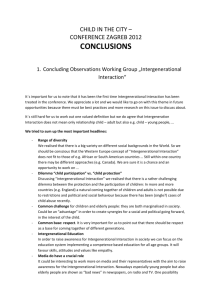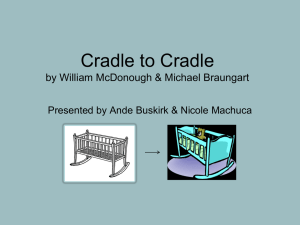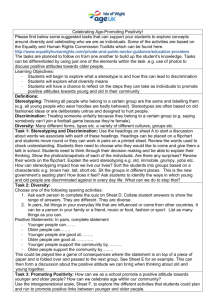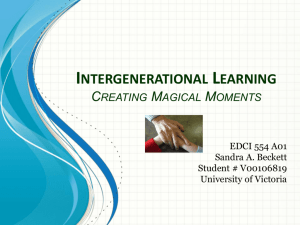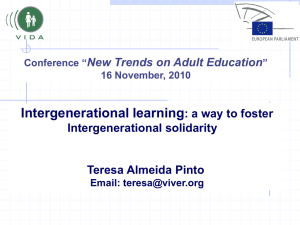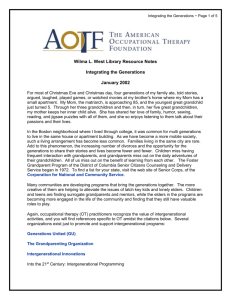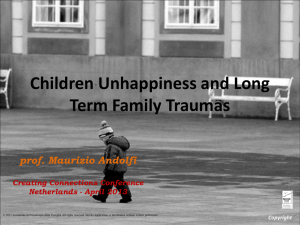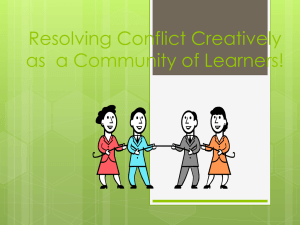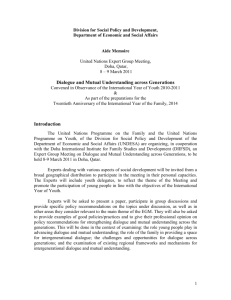Intergenerational relationships
advertisement
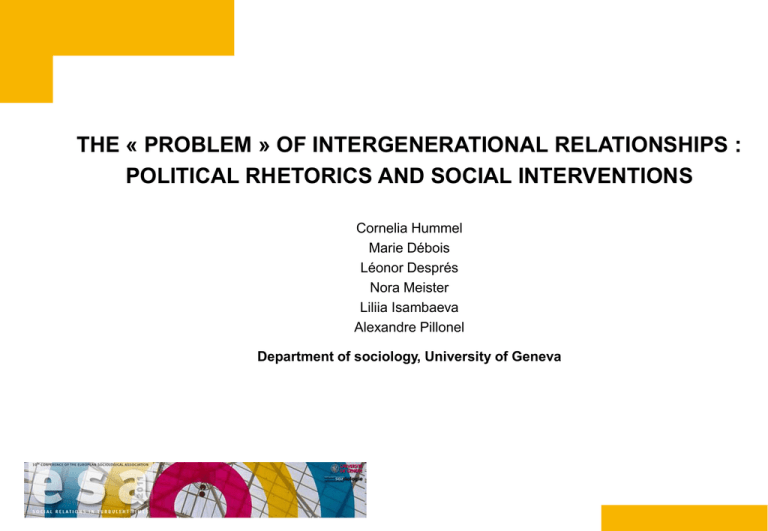
THE « PROBLEM » OF INTERGENERATIONAL RELATIONSHIPS : POLITICAL RHETORICS AND SOCIAL INTERVENTIONS Cornelia Hummel Marie Débois Léonor Després Nora Meister Liliia Isambaeva Alexandre Pillonel Department of sociology, University of Geneva Intergenerational relationships outside the family : a social problem ? Analysis in two fields: political discourse and social work Remi Lenoir (1999) 1. Increase of visibility of one social category 2. Constitution of a discourse about this category 3. Legitimation 4. Institutionnalization Research questions: • Which aspects of intergenerational relationships ? • Which definitions of the term “generation” (./. the scientific literature: genealogical generation, socio-historic generation Mannheim, welfare state generation - Attias-Donfut, generation as age group or age strata - Riley) ? • How is the “intergenerational problem” presented as a fact ? • Which preventive or palliative solutions are proposed to restore or maintain the ties between generations ? Who are the actors of this prevention or restoration? Method: Qualitative analysis (Atlas.ti) on a corpus including: a) Political reports produced by the Swiss Federal Council (5) b) Intergenerationnal projects (37, in the french speaking part of Switzerland, between 1990 and 2000). Results: a) Political reports - A changing society (demographic transformations, changes in the family, unemployment, etc.). direct or indirect impact on intergenerational relationships. Regulation: sustainability of social tranfers, social participation break-up with policies based on age, « society for all ages ». - Generation = position in the life course (childhood, adulthood, old age) associated with roles (education, work, pension). Distinction between actives and unactives. Results: a) Political reports - Intergenerational relationships = a challenge. How can intergenerational solidarity and equity be redefined in a changing society ? Regulation on national and local level Results: b) Intergenerational projects - Holders: childhood institutions, old age institutions, social affairs services. Professionnals. - Participants: children and elderly; Mr and Mrs Everybody - Activities: leisure, « being together » (e.g meals). Ordinary activities, the age of the participants makes it « intergenerational ». Results: b) Intergenerational projects - Living together: sharing an apartment, intergenerational housing (éco-quartiers, « eco neighborhood »). ! In the « éco-quartiers » projects, different definition of « intergenerational » all generations, all ages (not only children and elderly). Ecological and social sustainability. Results: b) Intergenerational projects - Arguments: population ageing, increasing longevity; age segregation; time-capital of seniors, intergenerational transmission. No mention of intergenerational conflict: preference given to positive values (participation, solidarity, social bonds). Results: b) Intergenerational projects In the projects, the argument chain jumps from population ageing to the need of action at the local level. The negative impact of the demographic transformations intergenerational relationships is taken for granted. on Population ageing problems at the global level (risk of generation gap) = problems at the local level (loss of intergenerational ties) need for action at the local level. Discussion: • Stages of Lenoir: a) Political reports = stage 2 (constitution of discourse) b) Intergenerational projects = stage 4 (institutionalization). Examples: - Federal Social Insurance Office, one domain renamed « Families, Generations and Society ». - Education, in the field of social work: courses on « intergeneration ». Discussion: • The same term for two different meanings: - Political reports: Intergenerational relations (symbolic), e.g. Generational contract - Projects: intergenerational relationships (concrete) between different different age groups. ! In french, same term (= « relations intergénérationnelles »). Discussion: • Intergenerational projects: shift from the symbolic to the concrete (relations relationships), from the global to the local, from the macro level to the micro level. Thank you !
